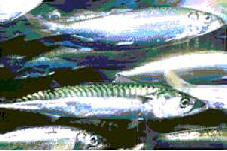|
The production of herring, mackerel and capelin in Norway has increased from 250,000 tonnes in 1990 to one million tonnes in 2001. The pelagic fleet has increased its profits seven-fold during the same period. The UK, Faroese and Icelandic industries have caught on and represent strong competition for raw material and pelagic exports.
Herring, mackerel and capelin represented 35 per cent of Norwegian wild-caught seafood exports, according to a report from the Norwegian Institute of Fisheries and Aquaculture (Fiskeriforskning). While a considerable volume of pelagic landings went straight to the fishmeal and fish oil plants in the past, today only four per cent of catches end up as fishmeal or fish oil.
The main reasons for the strong growth in pelagic production for human consumption are increased herring catches, increased mackerel landings by foreign vessels and the return of capelin in the Barents Sea. New markets in Eastern Europe have been a condition for the strong growth.
Improved raw material, due to gentler handling, has led to most of the herring and mackerel landings ending up on dinner tables. Forty to 45 per cent of mackerel landings over the past years have been made by UK, Faroese, Irish and Danish vessels. This is due to higher prices and higher production capacity than the competition.
"But the Norwegian industry will meet tougher competition in the future. With reduced whitefish quotas, pelagic fish have become more important for the fleet and the industry around the North Sea basin. New pelagic plants on the Faroe Islands and Shetland, among other places, will reduce the volume of fish landed by foreign vessels in Norway. Iceland is becoming a serious contender in the processed herring market, as they have been in the capelin market," said author of the report, Bjørn Inge Bendiksen.
By Odin Hjellestad
FIS Europe
|
